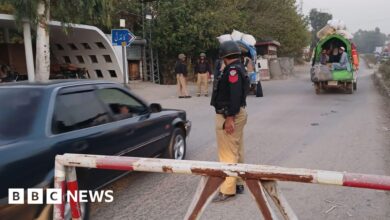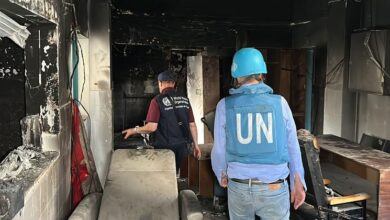On the front lines of the fight to stop the spread
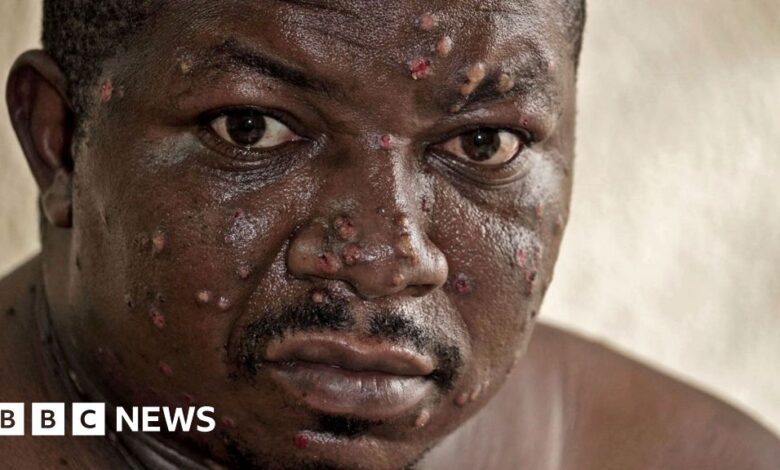
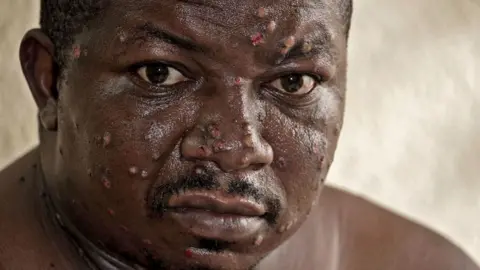 Mercy Juma / BBC
Mercy Juma / BBCEgide Irambona, 40, sits shirtless on a hospital bed, next to a window, in the treatment room he shares with two other men.
The afternoon sun shone down on Burundi’s main city, Bujumbura. His face, bathed in soft light, was covered in blisters. So was his chest, and his arms.
“I had swollen lymph nodes in my throat. It was so painful that I couldn’t sleep. Then the pain subsided there and went down my legs,” he told the BBC.
Mr. Irambona has mpox.
He is one of more than 170 confirmed cases recorded since last month in Burundi. One of the world’s poorest countries, it borders the Democratic Republic of Congo, the epicenter of several recent mpox outbreaks that have resulted in at least 450 deaths and 14,000 suspected cases so far this year.
In Burundi, no deaths have been recorded and it is unclear how deadly the current outbreak – of a new strain called Clade 1b – is because there is insufficient testing capacity in affected areas.
However, the outbreak has been declared a global health emergency amid concerns it could spread rapidly to previously unaffected countries and regions.
This is Mr Irambona’s ninth day of treatment at King Khaled University Hospital. One way the virus spreads is through close contact with an infected person, and it appears he passed it on to his wife.
She is also being cared for at the same facility.
“I had a friend who had blisters. I think I got it from him. I didn’t know it was mpox. Luckily, our seven children didn’t show any signs of it,” Mr. Irambona said, his voice trailing off.
This hospital in Bujumbura is home to one of the city’s three mpox treatment centers.
Of the 61 hospital beds, 59 are for infected patients – a third are under 15 and according to the World Health Organization, children are the hardest hit age group here.
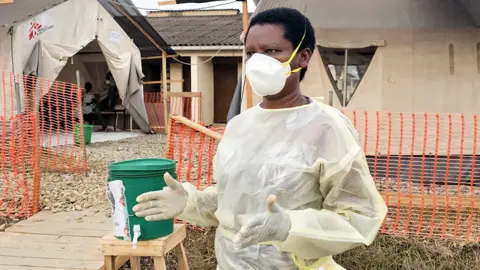 Mercy Juma / BBC
Mercy Juma / BBCOdette Nsavyimana is the doctor in charge of the hospital and says patient numbers are rising.
“We are currently setting up tents outside.” There are now three tents – one for triage, one for holding suspected cases and one for receiving confirmed cases before they are transferred to wards.
“It’s difficult, especially when the babies are born. They can’t be alone, so I have to keep the mothers here too. Even if they don’t have any symptoms… It’s a difficult situation,” said Dr. Nsavyimana, her voice muffled by her protective mask.
Burundi is currently seeing a rise in mpox cases.
“I’m worried about the numbers. If they keep increasing, we won’t be able to handle it anymore.”
Efforts are being made to isolate infected people from the rest of the hospital. There is a lot of red tape everywhere and visitors, who are required to wear protective gear, have to keep a physical distance from infected people.
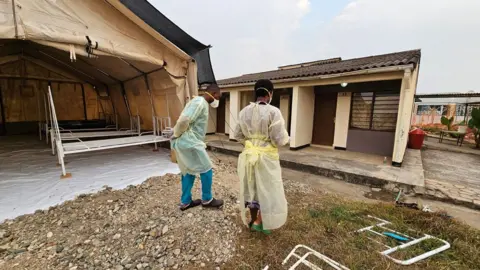 Mercy Juma / BBC
Mercy Juma / BBCHealth officials are concerned about limited resources. There is only one lab in the country that can test blood samples for the virus, there are not enough test kits and there is no vaccine.
Maintaining sanitation throughout Bujumbura is also difficult as access to basic resources such as water is limited in the city. There is a shortage of clean water and people can be seen lining up at public water taps.
Dr Liliane Nkengurutse, national director of the Public Health Emergency Operations Centre, said she was really concerned about the days ahead.
“This is a real challenge. Diagnosis is only done in one place, which slows down the detection of new cases.
“Health centers are calling the labs to say they have suspected cases, but it takes time for teams from the labs to deploy to where the suspected cases are to take samples.
“And it takes longer to get test results out. We need about $14m (£10.7m) to be able to take our response to the next level,” she said.
Despite reports that vaccines will arrive in the Republic of Congo as early as next week, there have been no reports of a similar move for Burundi.
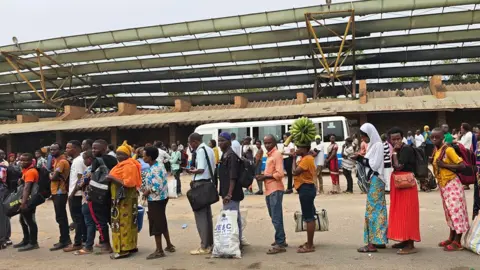 Mercy Juma / BBC
Mercy Juma / BBCPublic awareness of mpox is limited.
Bujumbura is just 20 minutes from the border with the Democratic Republic of Congo and is a hub for cross-border tourism and trade. But there is no sense of risk of an outbreak.
The city is bustling with activity. People are buying and selling as usual. Handshakes, hugs and close contact are the norm. There are long lines at bus stops, with people jostling to get on packed public transport.
“Many people do not understand the seriousness of this problem. Even when there are cases, people still just socialize with each other,” said Dr. Nkengurutse.
The BBC spoke to a number of people in Bujumbura and most had no idea what mpox was. And those who did had no idea it was spreading in their country.
“I have heard about this disease, but I have never seen anyone with it. I only see it on social media,” one person said.
“I know it affects babies and young people. I’m scared of it, but that doesn’t mean I’m just going to stay home. I have to work. My family has to eat,” said another.
Health officials know that convincing people to be more careful can be difficult in a skeptical population already facing economic challenges.
But they will continue to treat patients, make sure they get well and try to trace their contacts in an effort to stop the spread of the virus.
More BBC articles on mpox:
 Getty Images/BBC
Getty Images/BBC



